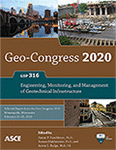Geo-Congress 2020
Reliability Based Design Charts for Spatially Variable MSW Landfill Slopes
Publication: Geo-Congress 2020: Engineering, Monitoring, and Management of Geotechnical Infrastructure (GSP 316)
ABSTRACT
In this paper, a numerical analysis is presented using fast Lagrangian analysis of continua (FLAC) 2D for the evaluation of slope reliability. The Cholesky decomposition technique has been used to develop the 2D non-Gaussian homogeneous random field. The performance function against MSW slope failure is formulated based on the linear regression equation of factor of safety obtained using numerical package, FLAC 2D. A reliability index of MSW slopes is computed using first order reliability method (FORM). The spatially variable design parameters of MSW landfill slopes are treated as random variables. The results of the present study provide an ample understanding of the spatial variability associated with shear parameters of MSW landfill slopes. The shear stress and shear displacements along the geomembranes (GMB) interfaces are presented with and without spatial variability. The effect of correlation distance on the reliability index of MSW landfill slope is presented in the form of design charts for different mean and COV values associated with unit weight, cohesion, and friction angle of the MSW.
Get full access to this article
View all available purchase options and get full access to this chapter.
REFERENCES
Babu, G. L. S., Reddy, K. R., and Chouksey, S. K. (2010). “Constitutive model for municipal solid waste incorporating mechanical creep and biodegradation-induced compression.” Waste Management, 30, 11-22.
Babu, G. L. S., Reddy, K. R., and Srivastava, A. (2014). “Influence of spatially variable geotechnical properties of MSW on stability of landfill slopes.” J. Hazard. Toxic Radio. Waste, 18(1), 27-37.
Basha, B. M., and Babu, G. L. S. (2010). “Optimum design for external seismic stability of geosynthetic reinforced soil walls: A reliability based approach.” J. Geotech. Geoenviron. Eng., 136(6), 797-812.
Basha, B. M., and Babu, G. L. S. (2012). “Target reliability-based optimisation for internal seismic stability of reinforced soil structures.” Geotechnique, 62(1), 55-68.
Bergado, D. T., Ramana, G. V., Sia, H. I., and Varun, V. (2006). “Evaluation of interface shear strength of composite liner system and stability analysis for a landfill lining system in Thailand.” Geotext. Geomembranes, 24(6), 371-393.
Chakma, S., and Mathur, S. (2013). “Postclosure long-term settlement for MSW landfills.” J. Hazard. Toxic Radio. Waste, 17(2), 81-88.
Griffiths, D. V., Huang, J., and Fenton, G. A. (2009). “Influence of spatial variability on slope reliability using 2-d random fields.” J. Geotech. Geoenviron. Eng., 135(10), 1367-1378.
Gross, B. A., Bonaparte, R., and Giroud, J. P. (2002). “Waste containment systems: problems and lessons learned.” Appendix F, Assessment and Recommendations for Optimal Performance of Waste Containment Systems, EPA, USA, 214.
Hicks, M. A., and Spencer, W. A. (2010). “Influence of heterogeneity on the reliability and failure of a long 3D slope.” Comp. Geotech.,37(7-8), 948-955.
Koerner, R. M., and Soong, T. Y. (2000). “Stability assessment of ten large landfill failures.” Adv. Transp. Geoenviron. Syst. Using Geosynthetic, ASCE GSP, Geo-Denver 2000, Denver, 1-38.
Negussey, D., Wijewickreme, W. K. D., and Vaid, Y. P. (1989). “Geomembrane interface friction.” Can. Geotech. J., 26(1), 165-169.
Sethi, S., Kothiyal, N. C., Nema, A. K., and Kaushik, M. K. (2013). “Characterization of municipal solid waste in Jalandhar city, Punjab, India.” J. Hazard. Toxic Radio. Waste, 17(2), 97-106.
Tabarroki, M., Ahmad, F., Banaki, R., Jha, S. K., and Ching, J. (2013). “Determining the factors of safety of spatially variable slopes modelled by random fields.” J. Geotech. Geoenviron. Eng., 139(12), 2082-2095.
Tchobanoglous, G., Theisen, H., and Vigil, S. (1993). Integrated solid waste management. McGraw-Hill, Inc., New York, N.Y.
U.S. Army Corps of Engineers. (1999). “Risk-based analysis in geotechnical engineering for support of planning studies, engineering and design.” Rep. No. 20314-1000, Dept. of Army, Washington, D.C.
Yin, Y., Li, B., Wang, W., Zhan, L., Xue, Q., Gao, Y., Zhang, N., Chen, H., Liu, T., and Li, A. (2016). “Mechanism of the December 2015 catastrophic landslide at the Shenzhen landfill and controlling geotechnical risks of urbanization.” Engineering, 2(2), 230-249.
Information & Authors
Information
Published In
Geo-Congress 2020: Engineering, Monitoring, and Management of Geotechnical Infrastructure (GSP 316)
Pages: 696 - 706
Editors: James P. Hambleton, Ph.D., Northwestern University, Roman Makhnenko, Ph.D., University of Illinois at Urbana-Champaign, and Aaron S. Budge, Ph.D., Minnesota State University, Mankato
ISBN (Online): 978-0-7844-8279-7
Copyright
© 2020 American Society of Civil Engineers.
History
Published online: Feb 21, 2020
ASCE Technical Topics:
- Analysis (by type)
- Engineering fundamentals
- Environmental engineering
- Finite difference method
- Geomechanics
- Geometry
- Geotechnical engineering
- Landfills
- Mathematics
- Methodology (by type)
- Municipal wastes
- Numerical methods
- Pollutants
- Shear stress
- Slopes
- Spatial analysis
- Spatial variability
- Stress (by type)
- Structural analysis
- Structural engineering
- Two-dimensional analysis
- Waste management
- Waste sites
- Wastes
Authors
Metrics & Citations
Metrics
Citations
Download citation
If you have the appropriate software installed, you can download article citation data to the citation manager of your choice. Simply select your manager software from the list below and click Download.
